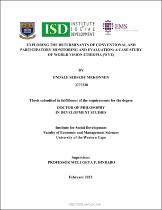| dc.contributor.advisor | Dinbabo, Mulugeta | |
| dc.contributor.author | Mekonnen, Endale Sebsebe | |
| dc.date.accessioned | 2023-02-16T07:47:36Z | |
| dc.date.available | 2023-02-16T07:47:36Z | |
| dc.date.issued | 2023 | |
| dc.identifier.uri | http://hdl.handle.net/11394/9574 | |
| dc.description | Philosophiae Doctor - PhD | en_US |
| dc.description.abstract | For the success of development programs at any level, the process of monitoring and evaluation
(M&E) plays an indispensable role. Although it has been exercised for decades in different
contexts, its multidisciplinary features and variegated applications made it a complex enterprise.
The complexity is due to multidisciplinary nature, differing methodological, philosophical stance
and theoretical assumptions The two approaches—conventional and participatory monitoring and
evaluation—said to be diametrically opposite in their epistemological, methodological stance, and
practices resulting in meeting different purposes. A great deal of study has been done in the area
of identifying the weaknesses of both approaches, but there has been no study about the possibility
of combining the determinants of these two approaches, to craft a better approach that responds to
differing needs of stakeholders at different stages of the monitoring and evaluation process. This
dissertation undertook to fill this gap. | en_US |
| dc.language.iso | en | en_US |
| dc.publisher | University of the Western Cape | en_US |
| dc.subject | Development programs | en_US |
| dc.subject | World Vision Ethiopia (WVE) | en_US |
| dc.subject | Non-Governmental Organizations (NGO) | en_US |
| dc.subject | Ethiopia | en_US |
| dc.title | Exploring the determinants of conventional and participatory monitoring and evaluation: A case study of world vision Ethiopia (wve) | en_US |
| dc.rights.holder | University of the Western Cape | en_US |

